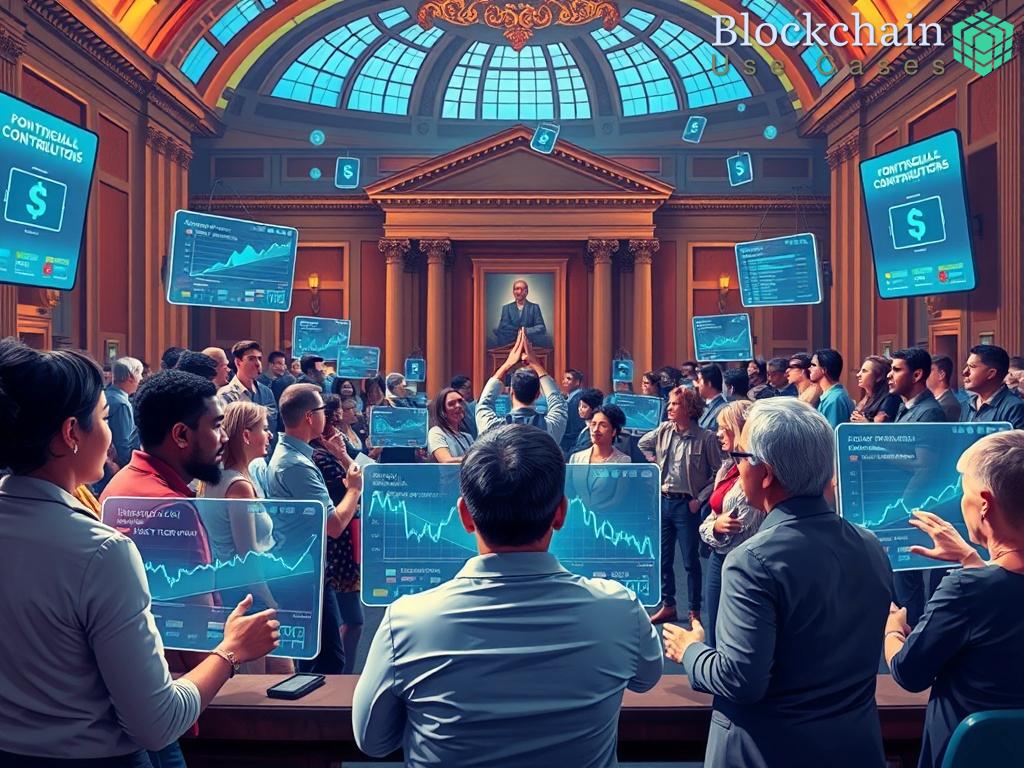Understanding Smart Contracts in Energy Markets

The advent of blockchain technology has revolutionized various sectors, and energy markets are no exception. Smart contracts, which are self-executing contracts with the terms of the agreement directly written into code, offer a myriad of possibilities for prosumers—those who both produce and consume energy. This section delves into how smart contracts are transforming energy trading and the benefits they present.
Smart contracts enable decentralized energy markets where transactions occur directly between prosumers without the need for intermediaries. This decentralization not only reduces costs but also enhances transparency. Each transaction can be recorded on the blockchain, providing an immutable ledger that can be audited by any participant. The implications of this transparency are significant, as they build trust among energy market participants.
Prosumers stand to gain immensely from adopting smart contracts. These contracts facilitate automated processes that can optimize energy trading, ensuring that energy is bought or sold at the most favorable rates. Below is a list of key benefits that smart contracts offer to prosumers in the energy market:
- Efficiency: Automated execution reduces the need for manual intervention, allowing for faster transactions.
- Cost Savings: By cutting out intermediaries, prosumers can save on transaction fees.
- Dynamic Pricing: Smart contracts can adjust prices in real-time based on market conditions, maximizing profits for prosumers.
- Reduced Risk: The automated nature of smart contracts minimizes the risk of human error and fraud.
- Enhanced Control: Prosumers can set specific terms for energy transactions, giving them greater control over their energy management.
While the potential of smart contracts in energy markets is promising, challenges remain. Issues such as regulatory compliance, security vulnerabilities, and the need for standardization must be addressed to fully realize the benefits of smart contracts. As the technology evolves, stakeholders must collaborate to develop frameworks that ensure safe and equitable use of smart contracts in energy trading.
Mechanisms of Energy Arbitrage for Prosumers
Energy arbitrage represents a powerful opportunity for prosumers to optimize their energy consumption and trading strategies. By leveraging smart contracts, prosumers can navigate the complexities of energy pricing and demand fluctuations to maximize their economic benefits. This section explores the intricate mechanisms that enable effective energy arbitrage in the context of smart contracts, detailing how technology empowers individuals to make data-driven decisions in a dynamic energy market.
The foundation of energy arbitrage lies in the inherent volatility of energy prices. Prices can vary significantly throughout the day due to factors such as supply-demand imbalances, grid constraints, and regulatory changes. Prosumers can take advantage of these fluctuations by employing smart contracts that automatically execute trades during peak and off-peak times. For instance, when energy prices are low, a prosumer can store surplus energy, only to sell it back to the grid at a higher price when demand surges. This strategy not only enhances profitability but also contributes to grid stability.
Smart contracts act as the backbone of energy arbitrage systems, automating the execution of trades based on predefined conditions. These self-executing contracts use real-time data feeds to monitor market conditions continuously. By integrating with IoT devices, smart contracts can assess factors such as energy generation from solar panels or wind turbines and consumer usage patterns. When the criteria set within the smart contract are met, the transaction is executed without the need for human intervention, ensuring a swift response to market dynamics. This automation reduces operational costs and minimizes risks associated with manual trading.
While the mechanisms of energy arbitrage through smart contracts offer numerous advantages, challenges persist. Prosumers must navigate issues related to regulatory compliance and interoperability between different energy systems and platforms. Moreover, the reliance on accurate real-time data raises concerns about potential vulnerabilities that could be exploited. Future developments in standardization and collaborative frameworks among stakeholders will be essential to enhance the resilience and efficiency of smart contract-based energy arbitrage systems, paving the way for a more sustainable and profitable energy landscape for prosumers.
Challenges and Solutions in Smart Contract Implementation
The deployment of smart contract-based energy arbitrage systems for prosumers is not without its hurdles. As the energy landscape evolves with technological advancements, various challenges emerge that can impede the effective utilization of smart contracts. Understanding these challenges and exploring possible solutions is crucial for stakeholders aiming to harness the full potential of this innovative approach. Below, we address some of these significant challenges and propose tailored solutions to foster a more robust ecosystem.
One of the primary challenges in implementing smart contracts in the energy sector is regulatory compliance. The energy market is heavily regulated, with numerous laws and guidelines governing energy production, distribution, and trading. This can create a complex landscape for prosumers who wish to leverage smart contracts for arbitrage opportunities. Non-compliance could lead to legal repercussions, thus stifling innovation. To tackle this issue, it is essential for industry stakeholders to engage with regulatory bodies to develop clear frameworks that accommodate smart contract technologies while ensuring adherence to existing regulations. By fostering a collaborative relationship with regulators, the energy sector can pave the way for a harmonized approach to smart contracts.
Another significant obstacle is the interoperability of different smart contract platforms and energy systems. Prosumers often utilize various technologies, and the lack of standard protocols can create silos that limit the efficiency of energy trading and arbitrage. It is imperative to establish industry standards that facilitate seamless communication between different systems. By promoting the adoption of common protocols and data formats, stakeholders can ensure that smart contracts operate effectively across diverse platforms. This approach not only enhances operational efficiency but also expands the opportunities available for prosumers to engage in energy arbitrage.
The reliance on real-time data for executing smart contracts introduces concerns regarding data integrity and security. Inaccurate or compromised data can lead to undesirable outcomes, potentially resulting in financial losses for prosumers. To mitigate these risks, it is crucial to implement robust data validation mechanisms and leverage decentralized data oracles that provide reliable and tamper-proof information. Additionally, employing advanced cybersecurity measures can fortify the systems against malicious attacks, ensuring that the smart contracts operate in a secure environment.
By addressing these challenges through collaboration, standardization, and enhanced security measures, the energy market can unlock the transformative potential of smart contract-based energy arbitrage systems. As prosumers navigate this evolving landscape, their ability to adapt and innovate will be pivotal in shaping a sustainable energy future.
Case Studies of Successful Energy Arbitrage Systems
The implementation of smart contract-based energy arbitrage systems has yielded remarkable success stories that exemplify the transformative potential of this technology. Various prosumers across different regions have harnessed innovative solutions to optimize their energy trading strategies, showcasing how smart contracts can effectively navigate market fluctuations and regulatory landscapes. Below, we delve into notable case studies that illustrate the practical applications of energy arbitrage, highlighting the strategies employed and the results achieved.
Examining specific instances of successful energy arbitrage provides valuable insights into the practicalities of implementing smart contracts in real-world scenarios. The following case studies highlight diverse approaches adopted by prosumers, offering a glimpse into the future of energy trading.
| Case Study | Location | Technology Used | Results Achieved |
|---|---|---|---|
| GreenGrid Initiative | Germany | Blockchain-based Smart Contracts | Increased profit margins by 30% during peak demand periods. |
| SolarShare Project | California, USA | IoT Integration with Smart Contracts | Enhanced energy utilization efficiency by 25% among participants. |
| WindPower Alliance | Denmark | Decentralized Energy Trading Platform | Reduced operational costs by 15% through automated trading. |
These case studies underscore how prosumers can leverage technology to not only enhance their economic outcomes but also contribute to a more resilient energy grid.
The successful application of energy arbitrage through smart contracts reveals several critical factors that contribute to the effectiveness of these systems. By synthesizing insights from the above case studies, we can identify essential elements that empower prosumers to thrive in a competitive energy market:
- Data-Driven Decision Making: Access to real-time data enables prosumers to make informed choices, optimizing their trading strategies based on market conditions.
- Automation: The seamless execution of trades through smart contracts reduces the burden of manual intervention, allowing for rapid responses to market fluctuations.
- Collaboration: Partnerships among prosumers, technology providers, and regulatory bodies foster a supportive ecosystem that encourages innovation.
- Scalability: Successful systems are designed to adapt and scale, accommodating the evolving needs of energy markets and participants.
As the energy landscape continues to evolve, these case studies serve as a testament to the potential of smart contracts in driving efficiency and profitability in energy arbitrage systems for prosumers.
Future Trends in Smart Contract-Driven Energy Trading
As the energy sector continues to evolve, the integration of smart contracts within energy arbitrage systems is poised to redefine traditional trading dynamics. The emergence of innovative technologies, coupled with increasing regulatory support, suggests a transformative landscape for prosumers. This section explores the anticipated trends that will shape the future of smart contract-driven energy trading, focusing on advancements in technology, evolving market structures, and consumer engagement.
Continuous advancements in blockchain, artificial intelligence (AI), and the Internet of Things (IoT) are set to enhance the effectiveness of smart contract-based energy arbitrage systems. Blockchain technology will not only improve transaction efficiency but also provide enhanced security and transparency. AI algorithms can analyze vast datasets to predict market trends and optimize trading strategies for prosumers. Furthermore, IoT devices can facilitate real-time monitoring of energy generation and consumption, enabling more agile and informed decision-making. As these technologies converge, they will empower prosumers to leverage smart contracts for greater profitability.
The traditional energy market structure is gradually shifting towards decentralized models, where prosumers play a vital role in energy production and consumption. As regulatory bodies adapt to these changes, we can expect the emergence of peer-to-peer energy trading platforms that utilize smart contracts to automate transactions. This decentralized approach not only democratizes energy trading but also encourages competition, leading to lower prices and increased accessibility for consumers. As more individuals and businesses adopt renewable energy sources, the demand for efficient trading mechanisms will further accelerate the adoption of smart contracts in energy markets.
With the rise of smart contract-driven energy trading, consumer engagement is expected to take on a new dimension. Prosumers will have increased control over their energy choices, allowing them to negotiate prices and terms tailored to their unique needs. Moreover, educational initiatives aimed at raising awareness about the benefits of smart contracts and energy arbitrage will empower consumers to make informed decisions. As a result, we can anticipate a more proactive approach to energy management, where consumers actively participate in energy trading, contributing to a more resilient and sustainable energy ecosystem.
Key Future Trends to Watch:
- Integration of AI and Blockchain: Enhanced predictive analytics and automated trading strategies.
- Decentralization of Energy Markets: Emergence of peer-to-peer trading platforms.
- Increased Consumer Empowerment: Greater control and negotiation capabilities for energy consumers.
- Regulatory Evolution: Supportive frameworks to facilitate smart contract adoption.
- Focus on Sustainability: Promotion of renewable energy sources and efficient trading practices.


















